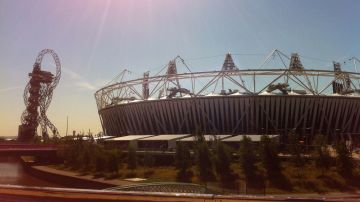Britain has so far spent £9.3 billion on hosting this year’s Olympic Games. UK Prime Minister David Cameron believes the Games will deliver a lasting legacy to the city of London. But others might beg to differ, most notably Greece, which blames hosting the 2004 Games in Athens for its current massive debt crisis.
So what are the Olympics: a sustainable legacy or an expensive extravagance?
Legacy:
-
The Olympics will revitalise local sport in Britain for generations to come. The legacy of sports in schools, where we have got half the country’s schools taking part in a schools Olympics. And the least tangible of all, which is the inspiration people will feel when they see great British athletes, whether rowing in a race, riding on a bicycle or running on the track. It’s well-known that this has a transformational effect. You can have any number of Government summits about sport in schools, but the sight of Sir Chris Hoy or someone like that has people in the shops saying ‘I want to buy a bicycle, I want to get on my bike’. That’s the bit you can’t touch, but it is very, very powerful and I think it can bring the country together.
David Cameron, British Prime Minister -
The legacy of the 2012 Olympics has preoccupied us almost as much as the event itself. Which is as it should be. When we invest so much in a two- and-half-week festival of sport, we expect to reap some longer-term benefits. Having said that, legacy is a problematic word, because it has so many elements to it. First there is the material legacy left behind in the shape of venues like the velodrome, the aquatic centre and the Olympic stadium itself. Then there is the cultural legacy, the impression of Britain that visitors take away with them. But the most important part, in my opinion, is the human legacy. British sport will receive an unquantifiable but powerful boost from the fact that the Olympics will be in the foreground of everybody’s thoughts.
Sir Steve Redgrave, five-times Olympic gold medallist -
Notwithstanding the massive social benefits from staging the Olympics, there has already been great investment into an area of London in desperate need of rejuvenation. East London is characterised by rising levels of child poverty, not opportunity and promise. This is no ‘circus’. This will have a long-term effect on the area and on the British economy.
Charlie Edwards, founder and editor of Political Promise -
The Beijing Olympic Games were in many ways the most extravagant games ever held. Stunning new stadiums were erected that have themselves become tourist sites. Large parts of northern Beijing (a city where land is expensive and scarce) were devoted to Olympic athletic, recreational and housing facilities. All this went well above budget, even before one counts the cost of the magnificent opening ceremonies. But what the city gained was an enormous investment in its basic infrastructure and in its public spaces. New subway lines began to criss-cross a city that had become paralysed by vehicular traffic. New highways were added, as ring-upon-ring roads encircled the central city. A stunning new airport terminal, larger than all of Heathrow, and perhaps the most beautiful on earth, opened to coincide with the Olympics, and new parks were built across this otherwise grey city.
William Kirby, professor of Chinese Studies, Harvard University -
The 1996 Summer Games had a tremendously positive effect on Atlanta’s urban landscape. Without the incentive of hosting the Games, who knows if an excellent public space like Centennial Olympic Park would have been constructed in our city centre. The park is a centrepiece in Downtown Atlanta’s revitalization efforts as several major high-rises, museums and attractions have been built on its periphery. It still serves as an amazing event space. Yes, the Olympics are costly, but they can help create a more sustainable urban environment for the host city.
Dahshi Marshall, urban planner, Atlanta Regional Commission
Extravagance:
-
No one knows how much the Olympics cost Greece, although many think it played a major role in producing the debt that spurred the country’s economic downfall. As one of the smallest countries to host the event, the Greeks still speak of 2004 as a defining moment, when the country crackled with optimism, confidence and pride. But Athens’ Olympic Park is no testimony to past glories. Instead, it is indicative of misplaced extravagance, desolation and despair.
Helena Smith, The Sydney Morning Herald -
The Olympics was all about consumption in order to capitalise on the Olympic phenomenon and create advertising spots to sell products. For us it was catastrophic.
Manolis Trickas, Councillor in the Athens suburb Hellenikon -
There is no doubt that hosting an Olympic festival produces a large measure of civic pride. When a host city is placed before the television, the eyes of two thirds of the world’s population, the event becomes a magnified public relations and advertising phenomenon. But civic pride aroused from such an endeavor is fleeting and the monuments built for the spectacle in the form of stadiums and sporting venues shortly become little more than ghostly reminders of once glorious days. In point of fact, the historical record of long-term benefit from Olympic-related sports facilities is one indelibly burdened by maintenance and operation costs that rise well above user-fee revenue.
Robert K Barney, International Centre for Olympic Studies at the University of Western Ontario in Canada -
The evidence from past Olympic Games hardly suggests that there’s a resounding economic gain from being the host city. Montreal’s 1976 Olympics left the city with $2.7 billion of debt that it finally paid off in 2005. A city looking for an economic boost would be wise to not host the Olympics.
Andrew Zimbalist, economist, Smith College, Massachusetts -
Economists generally find that local organisers and sports boosters routinely exaggerate the benefits and underestimate the costs of hosting major events such as the Olympics. If a city is using an expectation of a financial windfall as justification for hosting the Olympics, past experience suggests that the host will be in for a rude awakening.
Victor Matheson, economist, College of Holy Cross in Worcester, Massachusetts














